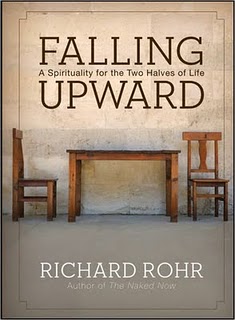Rohr's Falling Upward
Some comments I have shared with my online reading group reading this book.

********
I am amused and challenged by Richard Rohr’s comment that he has “prayed for years for one good humiliation a day, and then [he] must observe what [his]reaction to it” (128). He said this in the context that as he became more well known in his writings and in his ministry, there is an element of pride always hiding in the shadows. He adds that “spiritual leader” or “professional religious person” is “such a dangerous and ego-inflating self-image” (128). Spiritual growth, he emphases, takes place when we struggle with our shadow self.
I am amused and challenged by Richard Rohr’s comment that he has “prayed for years for one good humiliation a day, and then [he] must observe what [his]reaction to it” (128). He said this in the context that as he became more well known in his writings and in his ministry, there is an element of pride always hiding in the shadows. He adds that “spiritual leader” or “professional religious person” is “such a dangerous and ego-inflating self-image” (128). Spiritual growth, he emphases, takes place when we struggle with our shadow self.
I agree fully with the danger of the ‘ego-inflating self-image”. I am very lucky because the people I minister to and my patients and their parents are very affirming (I am a paediatrician). Asians in general gives a lot of respect to their elders especially if they are in leadership positions. These can be very ego-inflating and one of my constant struggles is with the sin of pride. It is so easy to give into your shadow self and believe your own hype. However, I will not go as far as Rohr to ask the Lord for a good humiliation a day. I guess I am not there yet and my ego-self-image is still very fragile. One day, I hope I will be able to do so.
********This week's (Chapter 6-8) reading forms the bridge between the two parts of the life journey he has been advocating. So far he has been describing the first half of life's journey which he liken to achieving or building-identity, career, family etc. I find that Rohr is very influenced by faith development theories of Eric Erikson, James Fowler, Lauwrence Kohlberg whic details human development which consists of a number of stages and one needs to overcome a crisis before one can attain the next year. It is fascinating that Rohr draws from mythology
and the great classics to reinforce the stage development theories such as loss, deep, falling and getting up. I have my doubts about faith development theories and I think Rohr is reading too much into it.
I am not comfortable with the way he brings in the Bible to support his theory. One glaring mistake is on page 49 where he writes "You will feel similar to Isaiah before he was sent into exile in Babylon.." Actually Isaiah was never exiled to Babylon. Isaiah lived during the Assyrian period. And the quote "In the noontime.." (Isa. 38:10) was spoken by King Hezekiah, not Isaiah as implied.
In spite of my misgivings about his theory, I find that there are many gems in the book. I am glad that he brought in the True Self and delighted that he points it to William Wordsworth's poem. I agree with Rohr that these few lines are pure theology in motion.
*********
I have enjoyed the autobiographic sharing by Richard Rohr in the chapter Necessary Suffering especially in his experience with the Roman Catholic Church. There is much there that is between the lines in what he shares but the final result is that he has developed a great understanding of the catholic church which he named “incarnational mysticism” – “Once you get it, there is no going backward, because nothing is any better” (76).
Basically I agree with him that Christians need a stronger and deeper ecclesiology. I say this as an Evangelical and a Presbyterian. I admit that our ecclesiology is rather thin and shallow. As Rohr notes, our ecclesiology must be linked to the Mystery of God. That is why I am so taken by his term incarnational mysticism. It reminds me of what Karl Rahler said that all Christians are mystics. It also resonates with my reading of Karl Barth which is drawing me more and more to appreciate the Mystery of God.
.
Labels: Books and Reading















0 Comments:
Post a Comment
<< Home